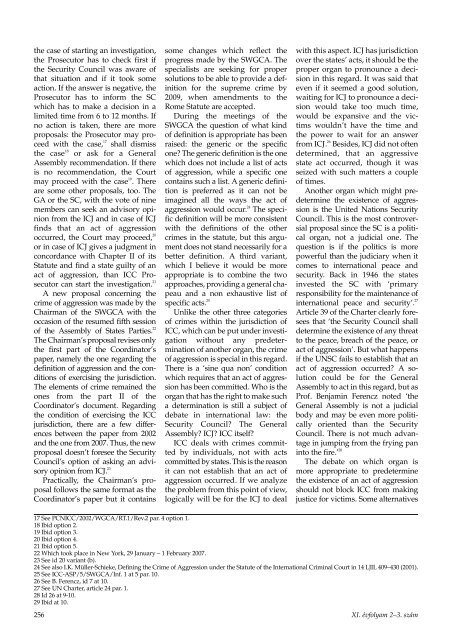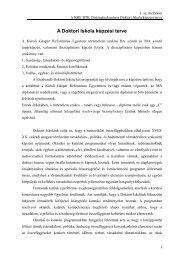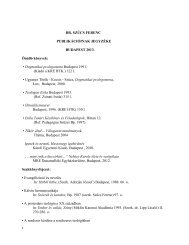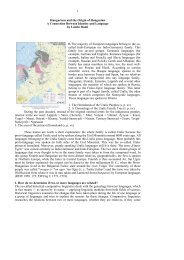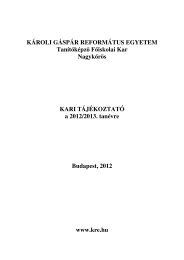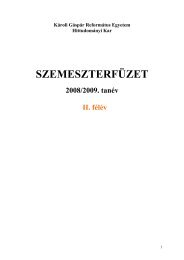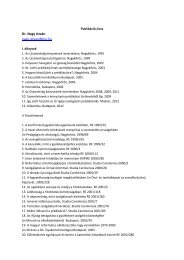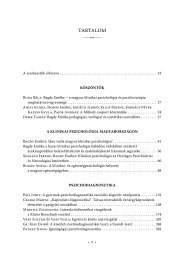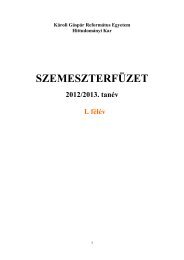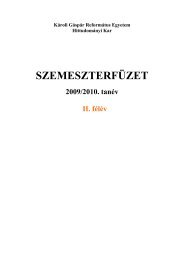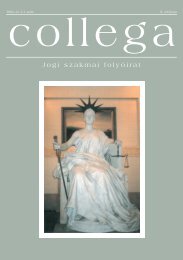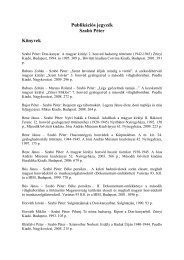collega - Károli Gáspár Református Egyetem
collega - Károli Gáspár Református Egyetem
collega - Károli Gáspár Református Egyetem
You also want an ePaper? Increase the reach of your titles
YUMPU automatically turns print PDFs into web optimized ePapers that Google loves.
the case of starting an investigation,<br />
the Prosecutor has to check first if<br />
the Security Council was aware of<br />
that situation and if it took some<br />
action. If the answer is negative, the<br />
Prosecutor has to inform the SC<br />
which has to make a decision in a<br />
limited time from 6 to 12 months. If<br />
no action is taken, there are more<br />
proposals: the Prosecutor may proceed<br />
with the case, 17<br />
shall dismiss<br />
the case 18<br />
or ask for a General<br />
Assembly recommendation. If there<br />
is no recommendation, the Court<br />
may proceed with the case 19 . There<br />
are some other proposals, too. The<br />
GA or the SC, with the vote of nine<br />
members can seek an advisory opinion<br />
from the ICJ and in case of ICJ<br />
finds that an act of aggression<br />
occurred, the Court may proceed, 20<br />
or in case of ICJ gives a judgment in<br />
concordance with Chapter II of its<br />
Statute and find a state guilty of an<br />
act of aggression, than ICC Prosecutor<br />
can start the investigation. 21<br />
A new proposal concerning the<br />
crime of aggression was made by the<br />
Chairman of the SWGCA with the<br />
occasion of the resumed fifth session<br />
of the Assembly of States Parties. 22<br />
The Chairman’s proposal revises only<br />
the first part of the Coordinator’s<br />
paper, namely the one regarding the<br />
definition of aggression and the conditions<br />
of exercising the jurisdiction.<br />
The elements of crime remained the<br />
ones from the part II of the<br />
Coordinator’s document. Regarding<br />
the condition of exercising the ICC<br />
jurisdiction, there are a few differences<br />
between the paper from 2002<br />
and the one from 2007. Thus, the new<br />
proposal doesn’t foresee the Security<br />
Council’s option of asking an advisory<br />
opinion from ICJ. 23<br />
Practically, the Chairman’s proposal<br />
follows the same format as the<br />
Coordinator’s paper but it contains<br />
some changes which reflect the<br />
progress made by the SWGCA. The<br />
specialists are seeking for proper<br />
solutions to be able to provide a definition<br />
for the supreme crime by<br />
2009, when amendments to the<br />
Rome Statute are accepted.<br />
During the meetings of the<br />
SWGCA the question of what kind<br />
of definition is appropriate has been<br />
raised: the generic or the specific<br />
one? The generic definition is the one<br />
which does not include a list of acts<br />
of aggression, while a specific one<br />
contains such a list. A generic definition<br />
is preferred as it can not be<br />
imagined all the ways the act of<br />
aggression would occur. 24 The specific<br />
definition will be more consistent<br />
with the definitions of the other<br />
crimes in the statute, but this argument<br />
does not stand necessarily for a<br />
better definition. A third variant,<br />
which I believe it would be more<br />
appropriate is to combine the two<br />
approaches, providing a general chapeau<br />
and a non exhaustive list of<br />
specific acts. 25<br />
Unlike the other three categories<br />
of crimes within the jurisdiction of<br />
ICC, which can be put under investigation<br />
without any predetermination<br />
of another organ, the crime<br />
of aggression is special in this regard.<br />
There is a ‘sine qua non’ condition<br />
which requires that an act of aggression<br />
has been committed. Who is the<br />
organ that has the right to make such<br />
a determination is still a subject of<br />
debate in international law: the<br />
Security Council? The General<br />
Assembly? ICJ? ICC itself?<br />
ICC deals with crimes committed<br />
by individuals, not with acts<br />
committed by states. This is the reason<br />
it can not establish that an act of<br />
aggression occurred. If we analyze<br />
the problem from this point of view,<br />
logically will be for the ICJ to deal<br />
with this aspect. ICJ has jurisdiction<br />
over the states’ acts, it should be the<br />
proper organ to pronounce a decision<br />
in this regard. It was said that<br />
even if it seemed a good solution,<br />
waiting for ICJ to pronounce a decision<br />
would take too much time,<br />
would be expansive and the victims<br />
wouldn’t have the time and<br />
the power to wait for an answer<br />
from ICJ. 26 Besides, ICJ did not often<br />
determined, that an aggressive<br />
state act occurred, though it was<br />
seized with such matters a couple<br />
of times.<br />
Another organ which might predetermine<br />
the existence of aggression<br />
is the United Nations Security<br />
Council. This is the most controversial<br />
proposal since the SC is a political<br />
organ, not a judicial one. The<br />
question is if the politics is more<br />
powerful than the judiciary when it<br />
comes to international peace and<br />
security. Back in 1946 the states<br />
invested the SC with ‘primary<br />
responsibility for the maintenance of<br />
international peace and security’. 27<br />
Article 39 of the Charter clearly foresees<br />
that ‘the Security Council shall<br />
determine the existence of any threat<br />
to the peace, breach of the peace, or<br />
act of aggression’. But what happens<br />
if the UNSC fails to establish that an<br />
act of aggression occurred? A solution<br />
could be for the General<br />
Assembly to act in this regard, but as<br />
Prof. Benjamin Ferencz noted ‘the<br />
General Assembly is not a judicial<br />
body and may be even more politically<br />
oriented than the Security<br />
Council. There is not much advantage<br />
in jumping from the frying pan<br />
into the fire.’ 28<br />
The debate on which organ is<br />
more appropriate to predetermine<br />
the existence of an act of aggression<br />
should not block ICC from making<br />
justice for victims. Some alternatives<br />
17 See PCNICC/2002/WGCA/RT.1/Rev.2 par. 4 option 1.<br />
18 Ibid option 2.<br />
19 Ibid option 3.<br />
20 Ibid option 4.<br />
21 Ibid option 5.<br />
22 Which took place in New York, 29 January – 1 February 2007.<br />
23 See id 20 variant (b).<br />
24 See also I.K. Müller-Schieke, Defining the Crime of Aggression under the Statute of the International Criminal Court in 14 LJIL 409–430 (2001).<br />
25 See ICC-ASP/5/SWGCA/Inf. 1 at 5 par. 10.<br />
26 See B. Ferencz, id 7 at 10.<br />
27 See UN Charter, article 24 par. 1.<br />
28 Id 26 at 9-10.<br />
29 Ibid at 10.<br />
256 XI. évfolyam 2–3. szám


